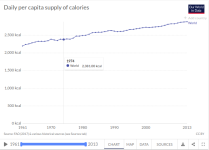DBT
Contributor
Decline in food production
Nature:
After two decades of impressive gains, global food production has slowed. The rocketing growth in grain production experienced during the so-called "Green Revolution" has ceased; now the gains come in tiny increments, too small to keep pace with population growth.
Incidence:
The world reaped its largest harvest of grain per capita in 1984; since then the amount of corn and wheat and rice per person has fallen by six percent. 1987 was the first in recent years that food production fell below consumption. World grain stocks in storage at the time of harvest dropped from 457 million tonnes to 390 million. By 1996, grain stockpiles had shrunk to less than two months' supply. A 1997 Environmental Protection Agency study found that, at a time when global food demand is likely to soar, actual international production of wheat, rice and other grains is likely to drop 7.6 percent by 2060.
The loss of momentum in world food output is widespread. Notably, the growth of grain production has slowed in several populous countries, including China, India, Indonesia and Mexico. The world area in grain has declined steadily from a record high in 1981.
The remarkable increases in food production during the 1960s and 70s come in part at the expense of soil and water resources. Since the 1970s soil erosion has increased sharply. For example, in the USA in 1976, farmers were estimated to be losing six tonnes of soil for every ton of grain produced. In the former Soviet Union and the USA erodible land is being converted to grasslands and woodlands. Across the southern fringe of the Sahara the agricultural frontier is retreating as a result of declining rainfall, land degradation, and dune formation. China and the USA have reduced the area of irrigated land. Water tables have fallen in both these countries and in the former Soviet Union and India, where wells are running dry and thousands of villages are relying on tank truck for drinking water. Climatic changes may further reduce land and water resources.
Nature:
After two decades of impressive gains, global food production has slowed. The rocketing growth in grain production experienced during the so-called "Green Revolution" has ceased; now the gains come in tiny increments, too small to keep pace with population growth.
Incidence:
The world reaped its largest harvest of grain per capita in 1984; since then the amount of corn and wheat and rice per person has fallen by six percent. 1987 was the first in recent years that food production fell below consumption. World grain stocks in storage at the time of harvest dropped from 457 million tonnes to 390 million. By 1996, grain stockpiles had shrunk to less than two months' supply. A 1997 Environmental Protection Agency study found that, at a time when global food demand is likely to soar, actual international production of wheat, rice and other grains is likely to drop 7.6 percent by 2060.
The loss of momentum in world food output is widespread. Notably, the growth of grain production has slowed in several populous countries, including China, India, Indonesia and Mexico. The world area in grain has declined steadily from a record high in 1981.
The remarkable increases in food production during the 1960s and 70s come in part at the expense of soil and water resources. Since the 1970s soil erosion has increased sharply. For example, in the USA in 1976, farmers were estimated to be losing six tonnes of soil for every ton of grain produced. In the former Soviet Union and the USA erodible land is being converted to grasslands and woodlands. Across the southern fringe of the Sahara the agricultural frontier is retreating as a result of declining rainfall, land degradation, and dune formation. China and the USA have reduced the area of irrigated land. Water tables have fallen in both these countries and in the former Soviet Union and India, where wells are running dry and thousands of villages are relying on tank truck for drinking water. Climatic changes may further reduce land and water resources.

